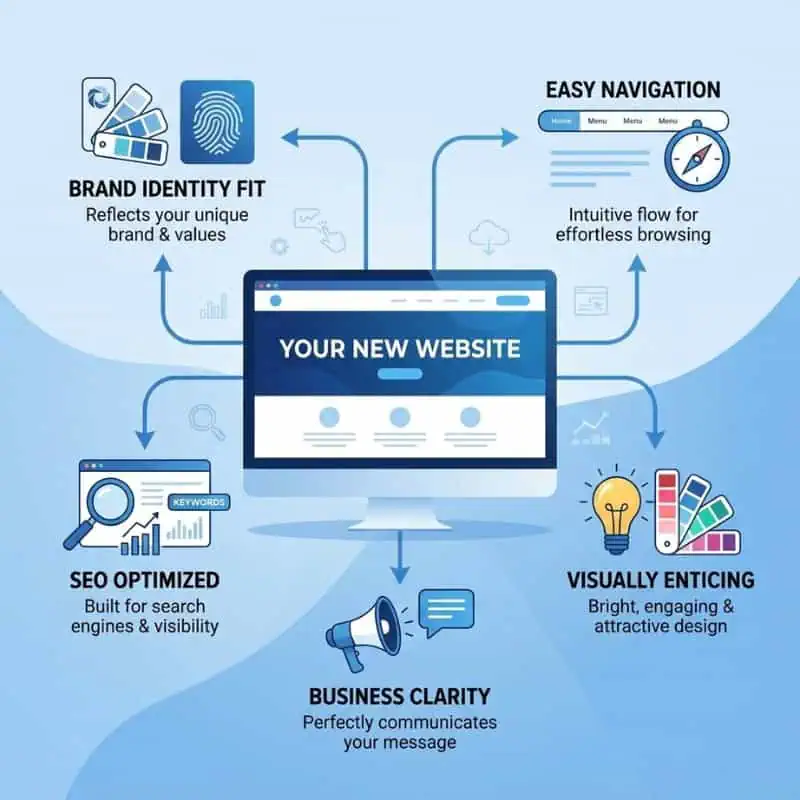- Written by Hozio
- November 20, 2025
- 3 Minute Read
Why Google's E-E-A-T Standards Matter for AI Content
Google’s Quality Raters use E-E-A-T (Experience, Expertise, Authoritativeness, Trustworthiness) standards to assess content quality. These aren’t just guidelines—they’re the framework that determines whether your content gets seen or buried.
Content with strong E-E-A-T signals has a 30% higher chance of ranking in the top 3 search positions. For NYC businesses competing in saturated markets, that difference can make or break your visibility.
The problem isn’t AI itself. What matters most about content is the insight behind the content, not who or what wrote it. Google penalizes content created purely for ranking manipulation, not content that genuinely helps users.

How Google's March 2024 Update Changed AI Content Rules
Google’s March 2024 search update specifically targets AI-generated “copycat content” and expects to reduce unhelpful, low-quality content by 40%. But the update isn’t a blanket ban on AI content.
Google does not penalize AI content, but it does penalize AI content created to manipulate search results. The company believes artificial intelligence can create helpful content, but recognizes the potential abuse in creating content that violates spam policies.
The key distinction is intent and quality. Google is cracking down on scaled content abuse—mass-produced content created to game rankings, whether AI-generated or human-written—that provides little to no value and is designed solely to manipulate search rankings.
Sites that relied heavily on AI-generated content have been completely removed from search results overnight, receiving “Pure Spam” notifications in Search Console indicating manual penalties from Google. This shows Google can detect and act on low-quality AI content at scale.
However, Google crawls, indexes, and ranks AI content when it’s useful, helpful, original, and satisfies aspects of E-E-A-T. The solution isn’t to avoid AI—it’s to use it responsibly within a framework that prioritizes human expertise and user value.
Looking for ways to improve your customer growth?
The Real Risk: AI Content Without Human Oversight
Google’s March 2024 search update specifically targets AI-generated “copycat content” and expects to reduce unhelpful, low-quality content by 40%. But the update isn’t a blanket ban on AI content.
Google does not penalize AI content, but it does penalize AI content created to manipulate search results. The company believes artificial intelligence can create helpful content, but recognizes the potential abuse in creating content that violates spam policies.
The key distinction is intent and quality. Google is cracking down on scaled content abuse—mass-produced content created to game rankings, whether AI-generated or human-written—that provides little to no value and is designed solely to manipulate search rankings.
Sites that relied heavily on AI-generated content have been completely removed from search results overnight, receiving “Pure Spam” notifications in Search Console indicating manual penalties from Google. This shows Google can detect and act on low-quality AI content at scale.
However, Google crawls, indexes, and ranks AI content when it’s useful, helpful, original, and satisfies aspects of E-E-A-T. The solution isn’t to avoid AI—it’s to use it responsibly within a framework that prioritizes human expertise and user value.

Building an E-E-A-T Compliant AI Content Workflow
The way forward is using a mix of human insight and experience as data that AI can use for generating content. This isn’t about replacing human expertise—it’s about amplifying it through technology.
The most effective approach is a hybrid workflow that combines AI throughput with human judgment on the parts that matter most. This gives you the speed and scale benefits of AI while maintaining the quality and authenticity that search engines and users demand.
The key is implementing a human-centric content framework by starting with personal experiences, conducting original research, collaborating with subject matter experts, and employing multiple human editing cycles.
Step-by-Step AI Content Creation Process
The most successful AI content strategies recognize that AI is a tool to augment human capabilities. Use AI for first drafts, then have human writers refine, fact-check, and add unique insights. Always have human editors review AI-generated content for accuracy, tone, and brand alignment.
Essential Content Audit Template for AI Risk Detection
A structured content audit becomes critical for any organization using AI. A proper AI content audit ensures that what your systems create still reflects human expertise and your brand’s reputation.
Scaling Content Creation While Protecting Your Search Rankings
The businesses winning in 2024 aren’t the ones avoiding AI—they’re the ones using it strategically. Great content still requires a human touch, with your judgment, creativity, and strategic insight transforming AI output into something exceptional.
There is still a way to use AI that can result in high quality people-first content, using a mix of human insight and experience as data for generating content. The key is maintaining human oversight at every stage while leveraging AI for efficiency and scale.
For NYC businesses ready to implement safe AI content strategies, we provide the local expertise and proven workflows you need. We’ve helped hundreds of businesses navigate these changes while maintaining their search visibility and brand integrity.





